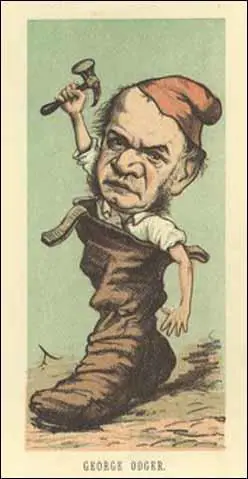Land and Labour League
In October 1869 George Odger helped to establish the Land and Labour League. Its formation was precipitated by discussion of the land question at the IWMA Basle Congress earlier that year. The League advocated the full nationalisation of land and was considered to be a republican working-class movement. Other members included Charles Bradlaugh, Johann Eccarius and Benjamin Lucraft. (1) After making one speech he was "set upon by a Conservative mob... and was severely beaten, suffering injuries that confined him for some time". (2)
The IWMA gave its support to strikes taking place in Europe. The financial help given by British trade unions to the striking Paris bronze workers led to their victory. The IWMA was also involved in helping Geneva builders and Basle silk-weavers. Wilhelm Liebknecht and August Bebel were gradually building up support for the organisation in Germany. David McLellan points out that the IWA was "steadily gaining in size, success and prestige". (3)

Karl Marx pointed out that: "The International was founded in order to replace the socialist and semi-socialist sects with a genuine organisation of the working class for its struggle... Socialist sectarianism and a real working-class movement are in inverse ratio to each other. Sects have a right to exist only so long as the working class is not mature enough to have an independent movement of its own: as soon as that moment arrives sectarianism becomes reactionary... The history of the International is a ceaseless battle of the General Council against dilettantist experiments and sects." (4)
Primary Sources
(1) Henry James, Lippincott's Monthly Magazine (July 1877)
The element of the grotesque was very noticeable to me in the most striking collection of the shabbier English types that I had seen since I came to London. The occasion of my seeing them was the funeral of Mr. George Odger, which befell some four or five weeks before the Easter period. Mr. George Odger, it will be remembered, was an English radical agitator, of humble origin, who had distinguished himself by a perverse desire to get into Parliament. He exercised, I believe, the useful profession of shoemaker, and he knocked in vain at the door that opens but to golden keys. But he was a useful and honorable man, and his own people gave him an honorable burial. I emerged accidentally into Piccadilly at the moment they were so engaged, and the spectacle was one I should have been sorry to miss. The crowd was enormous, but I managed to squeeze through it and to get into a hansom cab that was drawn up beside the pavement, and here I looked on as from a box at a play. Though it was a funeral that was going on I will not call it a tragedy; but it was a very serious comedy. The day happened to be magnificent - the finest of the year. The funeral had been taken in hand by the classes who are socially unrepresented in Parliament, and it had the character of a great popular "manifestation." The hearse was followed by very few carriages, but the cortege of pedestrians stretched away in the sunshine, up and down the classic gentility of Piccadilly, on a scale that was highly impressive. Here and there the line was broken by a small brass band - apparently one of those bands of itinerant Germans that play for coppers beneath lodginghouse windows; but for the rest it was compactly made up of
what the newspapers call the dregs of the population. It was the London rabble, the metropolitan mob, men and women, boys and girls, the decent poor and the indecent, who had scrambled into the ranks as they gathered them up on their passage, and were making a sort of solemn spree of it.
Student Activities
Child Labour Simulation (Teacher Notes)
Richard Arkwright and the Factory System (Answer Commentary)
Robert Owen and New Lanark (Answer Commentary)
James Watt and Steam Power (Answer Commentary)
The Domestic System (Answer Commentary)
